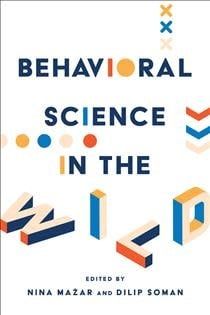The Curious Cat Tea & Books
Behavioral Science in the Wild by Nina Mažar, Dilip Soman
SKU 9781487527518
C$35.95
In stock: 1 available
Product Details
Behavioral Science in the Wild helps managers understand how to use insights from the behavioral sciences to create change in the real world.
Written to provide a grounding in behavioral insights research, Behavioral Science in the Wild assists managers to implement research findings on behavioral change in their own workplace operations. In particular, this book shares prescriptive advice on how a practitioner who reads a specific research finding from a paper can incorporate that finding into their business or policy problem.
Created as a follow-up to The Behaviorally Informed Organization co-edited by Dilip Soman, the premier book in UTP’s series of the same name, Behavioral Science in the Wild takes a step back to address the "why" and "how" behind BI’s origins, and how best to translate and scale behavioral science from lab-based research findings. Governments, for-profit enterprises, and welfare organizations have increasingly started relying on findings from the behavioral sciences to develop more accessible and user-friendly products, processes, and experiences for their end-users. While there is a burgeoning science that helps to understand why people act and make the decisions that they do, and how their actions can be influenced, we still lack a precise science and strategic insights into how some key theoretical findings can be successfully translated, scaled, and applied in the field.
Nina Mažar and Dilip Soman are joined by leading figures from both the academic and applied behavioral sciences to develop a nuanced framework for how managers can best translate results from pilot studies into their own organizations and behaviour change challenges using behavioral science.
Save this product for later
Behavioral Science in the Wild by Nina Mažar, Dilip Soman
Display prices in:CAD

